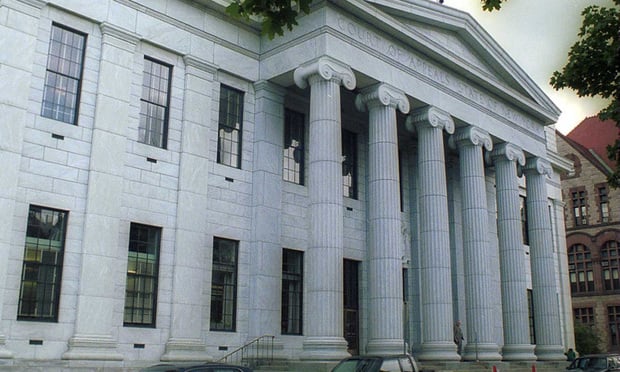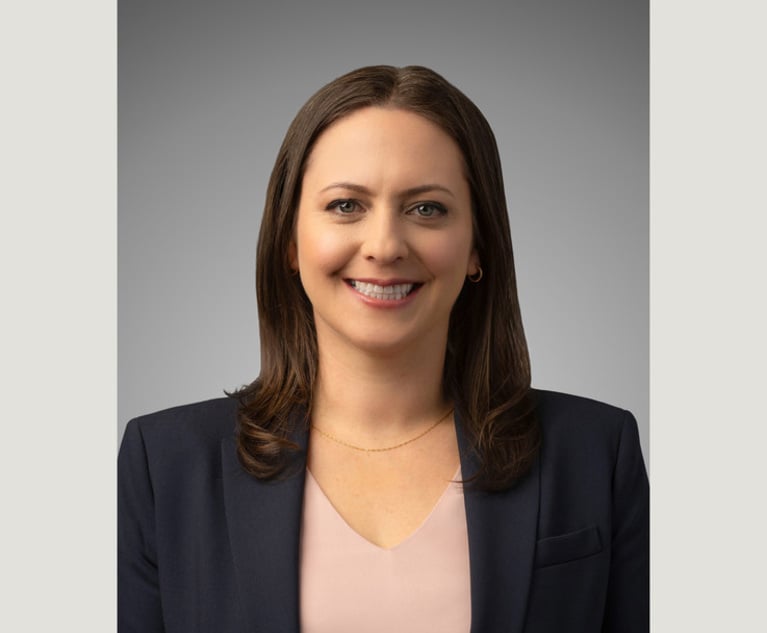Attorney's Violation of NY Home-Office Law Is Curable in Litigation, Court of Appeals Rules
The ruling was a unanimous reversal of a decision last year by the Appellate Division, which said litigation should have to start fresh if an attorney is found to have violated that law, making all past actions in the lawsuit null.
February 14, 2019 at 02:39 PM
4 minute read
 Court of Appeals for New York, Albany.
Court of Appeals for New York, Albany.
The New York Court of Appeals held Thursday that past actions taken in a lawsuit should not be thrown out if the initial attorney bringing the litigation is found to have violated Section 470 of the state's judiciary law, which requires an attorney bringing litigation in the state to maintain a permanent office in New York.
The ruling was a unanimous reversal of a decision last year by the Appellate Division, which said litigation should have to start fresh if an attorney is found to have violated that law, making all past actions in the lawsuit null and void.
That section of state law prohibits out-of-state attorneys from bringing a lawsuit in New York if they don't have a physical office in the state, regardless of whether they're licensed to practice there or not.
That's what allegedly happened when Arrowhead Capital Finance sued Cheyne Specialty Finance Fund in 2014. Arrowhead retained Barry Goldin, a solo practitioner based in Allentown, Pennsylvania, to handle the litigation, which was over alleged breaches of two trust agreements between the two companies.
Less than a year after the lawsuit was filed, attorneys for Cheyne claimed they had discovered Goldin lacked a permanent office in New York. Jeffrey Korn, a partner at Willkie Farr & Gallagher in Manhattan, said a private investigator hired by Cheyne found no evidence of an office for Goldin at the address he provided on legal documents.
Cheyne moved to dismiss the lawsuit about a year after discovering Goldin's alleged noncompliance with the in-state office mandate. The same day the court granted Cheyne permission to file that motion, William Dahill, a partner at Wollmuth Maher & Deutsch in Manhattan, filed a notice to that he would also appear on behalf of Arrowhead in the case.
Manhattan Supreme Court Justice Shirley Werner Kornreich of the commercial division had already thrown out part of the lawsuit on different grounds before that point. Cheyne was seeking to have the rest of it tossed since Goldin allegedly didn't have an office in New York when the complaint was filed in 2014.
That won't happen after the Court of Appeals ruled Thursday that the litigation may continue at the trial court where it left off since Arrowhead had retained Dahill before the rest of the suit was dismissed.
The decision was based partly on the court's 1974 decision in Dunn v. Eickhoff that found if an attorney is disbarred while a lawsuit is ongoing, the previous actions in that litigation would not be considered null. Arrowhead argued that the same rule should apply in this case. Associate Judge Michael Garcia agreed with that stance.
“It would be incongruous to conclude that, unlike the acts of a disbarred attorney, actions taken by an attorney duly admitted to the New York bar who has not satisfied Judiciary Law § 470's office requirement are a nullity,” Garcia wrote. “Instead, the party may cure the section 470 violation with the appearance of compliant counsel or an application for admission pro hac vice by appropriate counsel.”
Arrowhead was represented before the high court by Goldin. Goldin did not immediately return a call for comment Thursday.
Shaimaa Hussein, another partner at Willkie, argued before the court for Cheyne. She did not immediately return a request for comment.
The motion to dismiss was the result of investigatory work that's not ordinarily employed by a litigant who suspects an attorney may not have a permanent office in New York. Korn had written to the court in 2015 about Cheyne's efforts to scope out Goldin's alleged in-state address.
“A recent visit to the 240 Madison Avenue address that appears on pleadings beneath Mr. Goldin's Pennsylvania address revealed no evidence of him having a physical law office there: his name is not in the building directory and the only company seemingly occupying the floor listed by Mr. Goldin is called 'Edit Limited,'” Korn wrote.
Korn did not immediately return a request for comment on the case heading back to the trial court.
READ MORE:
Court of Appeals to Eye NY State Court Practice for Out-of-State Attorneys
Local Governments May Tax Telecommunications Infrastructure, NY High Court Rules
NYPD Can Withhold Disciplinary Records From Public, NY Court of Appeals Holds
This content has been archived. It is available through our partners, LexisNexis® and Bloomberg Law.
To view this content, please continue to their sites.
Not a Lexis Subscriber?
Subscribe Now
Not a Bloomberg Law Subscriber?
Subscribe Now
NOT FOR REPRINT
© 2025 ALM Global, LLC, All Rights Reserved. Request academic re-use from www.copyright.com. All other uses, submit a request to [email protected]. For more information visit Asset & Logo Licensing.
You Might Like
View All
Alston & Bird Adds M&A, Private Equity Team From McDermott in New York
4 minute read
Weil Lures DOJ Antitrust Lawyer, As Government Lateral Moves Pick Up Before Inauguration Day
5 minute read
Looking to the Future of the FDA and Its Impact on Drug Regulation in 2025
4 minute readTrending Stories
- 1Snapshot Judgement: The Case Against Illustrated Indictments
- 2Texas Supreme Court Grapples Over Fifth Circuit Question on State Usury Law
- 3Exploring the Opportunities and Risks for Generative AI and Corporate Databases: An Introduction
- 4Farella Elevates First Female Firmwide Managing Partners
- 5Family Court 2024 Roundup: Part I
Who Got The Work
J. Brugh Lower of Gibbons has entered an appearance for industrial equipment supplier Devco Corporation in a pending trademark infringement lawsuit. The suit, accusing the defendant of selling knock-off Graco products, was filed Dec. 18 in New Jersey District Court by Rivkin Radler on behalf of Graco Inc. and Graco Minnesota. The case, assigned to U.S. District Judge Zahid N. Quraishi, is 3:24-cv-11294, Graco Inc. et al v. Devco Corporation.
Who Got The Work
Rebecca Maller-Stein and Kent A. Yalowitz of Arnold & Porter Kaye Scholer have entered their appearances for Hanaco Venture Capital and its executives, Lior Prosor and David Frankel, in a pending securities lawsuit. The action, filed on Dec. 24 in New York Southern District Court by Zell, Aron & Co. on behalf of Goldeneye Advisors, accuses the defendants of negligently and fraudulently managing the plaintiff's $1 million investment. The case, assigned to U.S. District Judge Vernon S. Broderick, is 1:24-cv-09918, Goldeneye Advisors, LLC v. Hanaco Venture Capital, Ltd. et al.
Who Got The Work
Attorneys from A&O Shearman has stepped in as defense counsel for Toronto-Dominion Bank and other defendants in a pending securities class action. The suit, filed Dec. 11 in New York Southern District Court by Bleichmar Fonti & Auld, accuses the defendants of concealing the bank's 'pervasive' deficiencies in regards to its compliance with the Bank Secrecy Act and the quality of its anti-money laundering controls. The case, assigned to U.S. District Judge Arun Subramanian, is 1:24-cv-09445, Gonzalez v. The Toronto-Dominion Bank et al.
Who Got The Work
Crown Castle International, a Pennsylvania company providing shared communications infrastructure, has turned to Luke D. Wolf of Gordon Rees Scully Mansukhani to fend off a pending breach-of-contract lawsuit. The court action, filed Nov. 25 in Michigan Eastern District Court by Hooper Hathaway PC on behalf of The Town Residences LLC, accuses Crown Castle of failing to transfer approximately $30,000 in utility payments from T-Mobile in breach of a roof-top lease and assignment agreement. The case, assigned to U.S. District Judge Susan K. Declercq, is 2:24-cv-13131, The Town Residences LLC v. T-Mobile US, Inc. et al.
Who Got The Work
Wilfred P. Coronato and Daniel M. Schwartz of McCarter & English have stepped in as defense counsel to Electrolux Home Products Inc. in a pending product liability lawsuit. The court action, filed Nov. 26 in New York Eastern District Court by Poulos Lopiccolo PC and Nagel Rice LLP on behalf of David Stern, alleges that the defendant's refrigerators’ drawers and shelving repeatedly break and fall apart within months after purchase. The case, assigned to U.S. District Judge Joan M. Azrack, is 2:24-cv-08204, Stern v. Electrolux Home Products, Inc.
Featured Firms
Law Offices of Gary Martin Hays & Associates, P.C.
(470) 294-1674
Law Offices of Mark E. Salomone
(857) 444-6468
Smith & Hassler
(713) 739-1250







